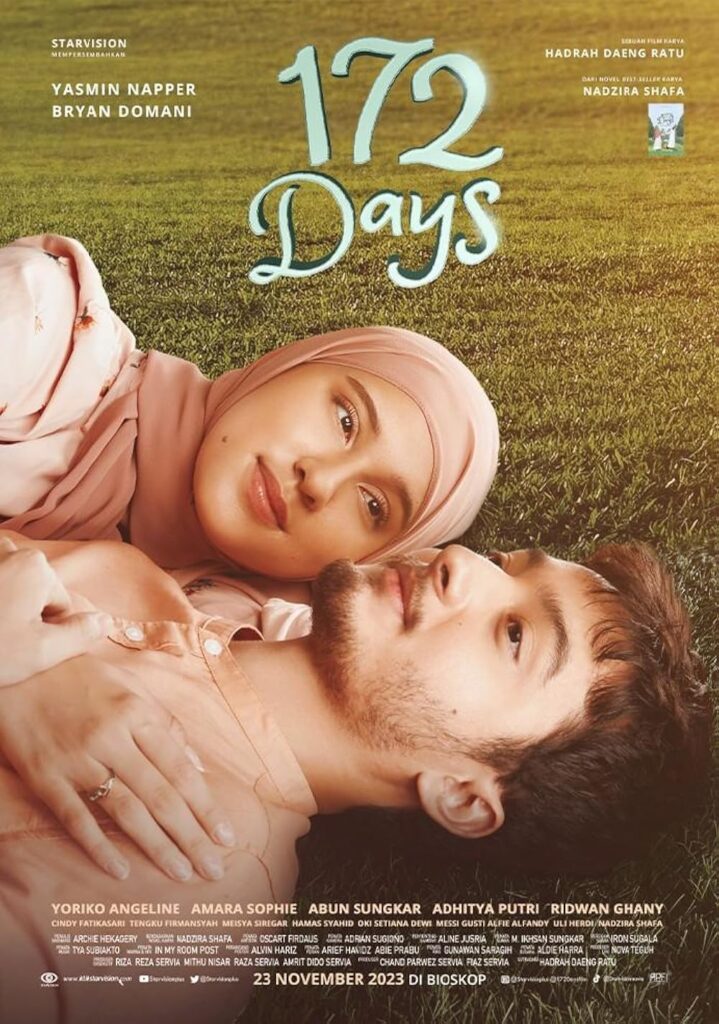Table of Contents
ToggleFilm Review of 172 Days by Nadzira Shafa Askar

An Intimate Journey Through Love, Loss, and Legacy
Nadzira Shafa Askar’s 172 Days is more than just a film—it’s an emotional pilgrimage through the labyrinth of grief and remembrance. Inspired by her real-life experiences and the heartfelt story of her late fiancé, the movie serves as a tribute to enduring love, spiritual growth, and healing. As the narrative unfolds over the titular 172 days, the audience is taken on a soul-stirring journey that leaves a lingering impact.
A Love Beyond Time
At its core, 172 Days revolves around the poignant story of Nadzira and her beloved, Ameer Azzikra, the son of a renowned religious preacher in Indonesia. Their love story, brief yet beautiful, resonates deeply with audiences familiar with themes of faith, destiny, and divine timing. What makes this film truly powerful is its raw emotional honesty. It’s not romanticized for cinematic flair but instead offers a glimpse into a young woman’s real heartbreak and her journey toward peace.
Nadzira’s portrayal of herself—vulnerable, strong, and spiritually grounded—is both authentic and inspiring. She doesn’t play a character; she relives her memories, making every scene feel deeply personal. It’s a rare move for a writer to turn her diary into a screenplay and even rarer to perform in it. Yet, she does both with grace, turning 172 Days into a cinematic memoir.
The Cinematic Language of Grief
From a filmmaking perspective, 172 Days excels in its visual storytelling. The cinematography by the production team captures the serenity of prayer, the solitude of mourning, and the brief sparks of joy that memory can reignite. Scenes bathed in soft natural light convey a dreamlike tone, reflecting Nadzira’s inner world—a mix of painful longing and spiritual surrender.
The use of flashbacks in 172 Days is particularly noteworthy. They are not used merely as narrative devices but as emotional touchstones. Each flashback slowly fills the gap between present grief and past love, helping the audience understand the depth of Nadzira’s pain and the immensity of what she lost.
Faith as Foundation
One of the most distinct features of 172 Days is how it weaves Islamic teachings and spirituality into the storyline. The film avoids heavy-handed preaching and instead opts for subtle, natural integrations of faith—daily prayers, recitations, and moments of self-reflection. These elements lend a sense of peace and acceptance to the film’s overall tone. The loss experienced by Nadzira isn’t portrayed as a dead end, but as a door to spiritual growth.
Audiences familiar with Islamic practices will appreciate the sincerity with which these moments are portrayed, while those unfamiliar will gain respectful insight into the emotional strength that faith can provide during times of loss.
Soundtrack That Speaks to the Soul
Music in 172 Days plays a significant role in accentuating the emotional resonance of the film. The background score—soft, meditative, and at times heart-wrenching—amplifies the gravity of key scenes. The soundtrack doesn’t overshadow the performances but rather supports them, giving the audience room to feel rather than just observe.
Particularly moving are the sequences where music and silence interplay. At times, the absence of sound speaks louder than words or melodies, allowing the audience to sit with the characters’ emotions.
A Personal but Universal Tale
Though deeply rooted in Nadzira’s personal experience, 172 Days has a universal appeal. It speaks to anyone who has loved and lost, who has grieved and sought healing. It tells us that moving on doesn’t mean forgetting, and that grief, when embraced with sincerity, can become a catalyst for transformation.

The title 172 Days might suggest a finite timeline, but the emotions it explores stretch far beyond that. The number becomes symbolic—not just of the time Nadzira had with Ameer, but also of the precious, fleeting nature of life itself. Every second counts, and every day has the potential to leave an imprint on the heart.
A Brave Artistic Endeavor
Turning personal grief into a public narrative is a brave act. For Nadzira Shafa Askar, 172 Days is more than just a film—it is a living memorial. Her decision to turn her mourning into meaningful art is admirable, especially considering the emotional labor involved. The vulnerability with which she presents her story gives 172 Days an emotional depth not often seen in modern cinema.
By writing, co-producing, and starring in the film, Nadzira takes full creative control of her narrative. This autonomy ensures that the story is told exactly how it was meant to be—without embellishments, without sensationalism, and without compromise.
The Social Impact of 172 Days
Beyond cinematic circles, 172 Days has sparked conversations about mental health, grief, and young love. It encourages viewers to be open about their emotional struggles and seek solace in community and spirituality. In a time where quick entertainment often overshadows substance, 172 Days dares to be different. It is slow, deliberate, and contemplative—a film that invites audiences to pause and reflect.
The film has also helped shine a light on the often-overlooked emotional journeys of young Muslim women navigating love, loss, and life. In doing so, it has provided representation and relatability to a demographic seldom portrayed with such depth on screen.
Final Verdict
172 Days is a beautiful example of cinema used as personal catharsis and public reflection. It is a film that will resonate most deeply with those who have experienced the sting of loss and the comfort of faith. It doesn’t promise closure but offers a path to understanding and acceptance.
The film’s strength lies in its honesty. It does not try to “fix” grief or offer easy answers. Instead, it holds space for it—acknowledging its presence and allowing it to transform the protagonist in meaningful ways.

Conclusion
Nadzira Shafa Askar’s 172 Days is a heartfelt, courageous, and ultimately healing film that reminds us of the fragility of life and the eternal nature of love. With its sincere storytelling, faith-driven narrative, and emotional authenticity, the movie stands out as a powerful contribution to contemporary Indonesian cinema.
Whether you’ve experienced grief personally or are simply a lover of meaningful films, 172 Days offers an unforgettable journey of the heart—one that lingers long after the screen fades to black.
